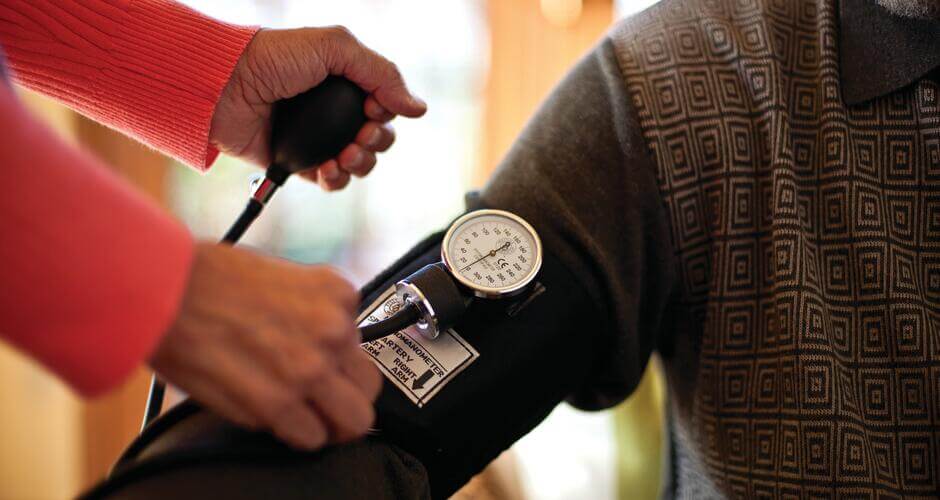There’s more to healthy living than good genes, good numbers, healthy weight and sound diet. Sanford Health, a Good Samaritan Society partner company, offers a multitude of preventive screenings that provide a more detailed look at your overall health, including:
- Cholesterol, blood sugar and blood pressure checks
- Heart and vascular screenings
- Lung test
- Mobile screening
Walk-in cholesterol, blood sugar and blood pressure checks
Blood pressure checks are free and cholesterol and blood sugar tests are available for a nominal fee. These services are also available on an outreach basis for schools, churches, community events and area businesses.
Walk in today: Find a Sanford Health location
Heart and vascular screenings
The Heart Screen at the Center for Screening uses advanced tools and diagnostics to uncover critical details about the health of your heart. Screenings include:
- CT calcium score
- EKG
- Non-fasting cholesterol
- Blood pressure
- Body mass index (BMI)
- Framingham score (risk estimate for developing heart disease in the next 10 years)
Whether you’re 40 or 70, strokes can happen — anytime. The Vascular Screen at the Center for Screening uses advanced tools and diagnostics to uncover critical details about the health of your vascular system. This screen is for those age 40 and older. Type 1 diabetics should get these preventive screenings at age 30 or older. Screenings include:
- Stroke/carotid artery ultrasound
- Abdominal aortic aneurysm ultrasound
- Ankle/brachial index
Pulmonary lung function test
A simple test to help identify people who may have lung disease. The pulmonary lung function test is performed by a registered respiratory therapist and includes:
- Oxygen saturation measurement (an estimate of the amount of oxygen in your blood).
- Interview: Scored questions about your breathing. A score will be given for the risk of asthma, COPD and sleep apnea.
- Spirometry: A breathing test that measures the speed and amount of air you can blow out of your lungs after taking in a deep breath.
If you have any of the following problems you should consider having a pulmonary lung function test:
- Trouble breathing
- Shortness of breath
- Feeling like you are not getting enough air
- Decrease ability to exercise or do other activities
- A cough that won’t go away
- Coughing up mucus or blood
- Pain or discomfort when breathing in or out
Mobile screening
The Sanford Screening Center also offers a mobile screening unit to provide heart and vascular screenings to the region’s communities, bringing access to screenings closer to you.
Preventive screening for common diseases
What is a preventive screening?
A screening test is done to find possible health problems or diseases in people who don’t have any symptoms of disease. The goal is to find a problem early enough to lower the risk for the disease. Or to find it early enough to treat it before it gets worse.
Health care providers don’t use screening tests to diagnose disease. But screening tests help find people who may need more testing to find out if they have a disease or other health problem.
When is a preventive screening helpful?
A screening test is helpful when it can clearly find a possible problem. A screening test works when the results clearly show that there is or isn’t a problem. Screening tests are not 100% accurate in all cases. But having them as recommended by your health care provider is better than not having them at all. Some screening tests can cause more problems than they help if used in people who aren’t at high risk for disease, or for very rare diseases.
Some common screening tests
Talk with your health care provider about when to get screening tests. Your provider will base the schedule on your age, overall health, and health history. Below are some examples of common screening tests.
Cholesterol
Cholesterol is a waxy, fat-like substance that can be found in all parts of the body. It helps your body make cell membranes, some hormones, and vitamin D. The cholesterol in your blood comes from 2 sources: from the food you eat and from your liver. But your liver makes all of the cholesterol your body needs.
Cholesterol and other fats are carried in the bloodstream as spherical particles called lipoproteins. The 2 most commonly known lipoproteins are low-density lipoproteins (LDL), or “bad” cholesterol, and high-density lipoproteins (HDL), or “good” cholesterol.
Cholesterol screening is done with a blood test. If your cholesterol results are high, you have a higher risk for cardiovascular disease than people with cholesterol in the normal range. You can lower your risk for heart disease by lowering your cholesterol. But keep in mind that you can still have heart disease even with cholesterol levels in the normal range.
Fecal occult blood test
Fecal occult blood is found by looking for it with a microscope or by using chemical tests for hemoglobin (blood) in the stool. People with blood in their stool may have a growth that may be colorectal cancer. For the test, you collect 3 stool samples. The samples are examined under a microscope.
Blood in the stool may be caused by things other than cancer. It may be caused by certain medicines or foods, bleeding in your digestive tract, or hemorrhoids. The American Cancer Society recommends starting this test at age 45 if you are at average risk for colorectal cancer.
Pap test
Pap tests, or Pap smears, are samples of cells taken from your cervix. The sample is examined under a microscope to check for changes that might indicate cervical cancer. The Pap test is an important screening test in sexually active women younger than 65. It can find cancer at a stage when there are often no symptoms. Even if your Pap results are abnormal, that may not mean you have cervical cancer. Some experts recommend that certain women get screened for HPV (human papillomavirus) at the same time as the Pap test is done.
Prostate specific antigen (PSA)
This blood test measures the prostate specific antigen (PSA) levels in the blood. Antigens are any substances that make your immune system react. PSA levels can be higher than normal if you have prostate cancer. But other problems can cause a high PSA level. These include benign prostatic hyperplasia (BPH). BPH is not cancer. It is when your prostate swells. The PSA test is not recommended for all men. Experts disagree on whether it is needed. Some groups, such as the U.S. Preventive Services Task Force (USPSTF), now recommend against PSA screening. Talk with your health care provider about the pluses and minuses of PSA screening. Some of the cons include unneeded testing and procedures, extra costs, and much more anxiety.
Mammogram
Many expert groups, including the USPSTF, recommend mammograms for breast cancer every 1 year to 2 years after age 50. This test accompanies a clinical breast exam.
Colonoscopy and other preventive screenings for colon cancer
For people at average risk, the American Cancer Society recommends that colorectal screening start at age 45. Other organizations, including the USPSTF, say you should start screening at age 50.
Multiple tests are available and are used at different times. They are:
- Flexible sigmoidoscopy every 5 years
- CT colonography (virtual colonoscopy) every 5 years
- Colonoscopy every 10 years
- Fecal occult blood test or fecal immunochemical test every year
- Stool DNA test every 3 years
You will need a follow-up colonoscopy if you choose any other test but colonoscopy and have an abnormal test result. Talk with your health care provider about which tests are best for you.
Some people need preventive screenings using a different schedule because of their personal or family history. Talk with your doctor about your health history.
Diabetes or prediabetes
The American Diabetes Association recommends adults be screened for diabetes or prediabetes starting at age 45. This is true no matter how much you weigh. You should also get screened if you are overweight or obese and have one or more other risk factors for diabetes.
Talk with your health care provider about all of these tests, as well as other types of screening tests. Not all providers agree on which preventive screenings should be done and for which age groups.




